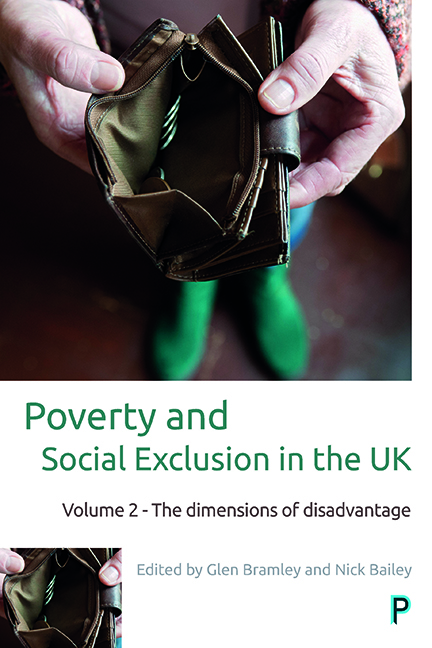nine - Housing and the living environment
Published online by Cambridge University Press: 12 April 2022
Summary
Introduction
In the post-war British welfare state, housing was seen as one of the key sources of welfare, primarily through the vehicle of public housing but also through regulation of rents and standards and, increasingly, through the provision of Housing Benefits and Allowances. However, more recently, housing has been characterised as ‘the wobbly pillar’ of the welfare state, not least because of the increasingly market-dominated system of housing provision in UK and many other countries (Torgesen, 1987). Yet, for a number of reasons, housing can still be argued to be critical: some core housing conditions remain among the most universally supported of the ‘essentials of life’; housing and related utility costs are a key driver of adverse patterns and changes in living standards; housing tenure is key to people's sense of security and control; and the state of the local neighbourhood is a major influence on people's quality of life. This chapter will discuss measures of housing (in)adequacy or housing need, and report on how these deprivations are associated with core and wider measures of poverty. It will look at changes over time, particularly since the 1999 PSE survey but also referring to analyses of UK longitudinal surveys (Bramley, 2016). Some of the key changes in the housing market, particularly in the balance of tenures, rent and price levels, will be discussed in terms of their impacts on housing-related aspects of poverty.
One particular housing-related issue is the cost of energy required to keep the home adequately warm and free from damp or related health-threatening problems. Given the combination of a relatively energy-inefficient housing stock and a dramatic rise in energy costs since the mid-2000s, ‘fuel poverty’ has become a massively bigger issue, contributing significantly to the deterioration in several housing-related material deprivations since 1999. However, changes in the measurement of fuel poverty have arguably obscured this significant policy failure. A later section of this chapter discusses fuel poverty.
The neighbourhood dimension of the living environment has an important impact on people's quality of life, and hence indirectly on their health and well-being, as well as influencing their ability to access services, build social networks, and feel safe from crime or anti-social behaviour.
- Type
- Chapter
- Information
- Poverty and Social Exclusion in the UK Vol 2The dimensions of disadvantage, pp. 225 - 244Publisher: Bristol University PressPrint publication year: 2017



